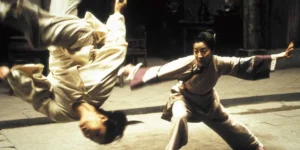With tai chi exercise, it is common to feel surprised by how you feel afterward! Many beginners experience tiredness, muscle soreness, or even feeling a bit clumsy or dizzy. Don’t worry—this is completely normal. These feelings happen because Tai Chi uses your muscles and balance system in new ways. And these initial feelings are temporary. With regular tai chi exercise, you’ll start feeling the true benefits: calm energy, relaxed muscles, better balance, and a peaceful mind. Discover why these first feelings happen and how they change.
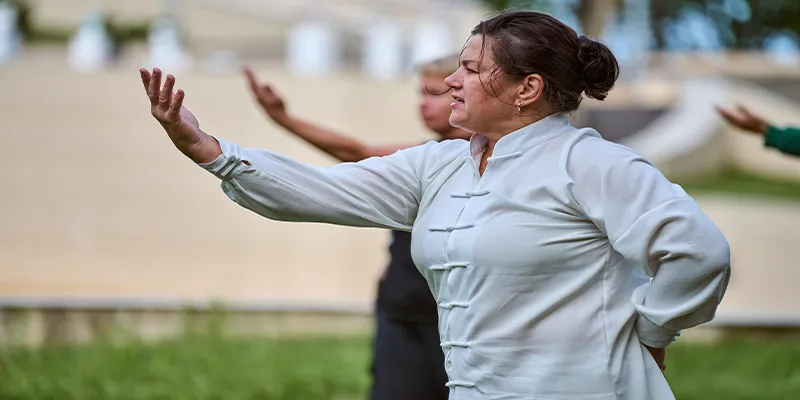
Feel Tired After Doing Tai Chi Exercise
When you try Tai Chi for the first time, it often makes you feel tired because your body and brain are working in new ways they aren’t used to.
Tai Chi looks slow and gentle, but it asks your muscles to hold positions that feel strange at first. These positions use many muscles you don’t normally use much in daily life, especially in your legs, back, and stomach. For example, keeping your legs slightly bent and your body balanced for a long time is hard work for muscles that aren’t strong yet. Your brain is also working very hard. It must focus on learning new movements, remembering the order of steps, controlling your breathing, and keeping your posture correct all at the same time. This much concentration can be mentally tiring.
Tai Chi exercise also teaches you to move with control and awareness, which means your muscles are working carefully instead of moving fast or loosely. This careful, controlled movement uses energy differently than quick exercises. Your breathing might change too, as you learn to coordinate it with the movements, which can feel strange and tiring at first.
All these things together, including using new muscles, intense mental focus, slow controlled movements, and new breathing patterns, require more effort than your body is prepared for initially. Just like learning any new physical skill, your body needs time to adapt, and this adjustment process naturally makes you feel tired at the beginning.
Feel Dumb When Doing Tai Chi Exercise
Feeling dumb when you start Tai Chi exercise is very normal and happens for a few reasons.
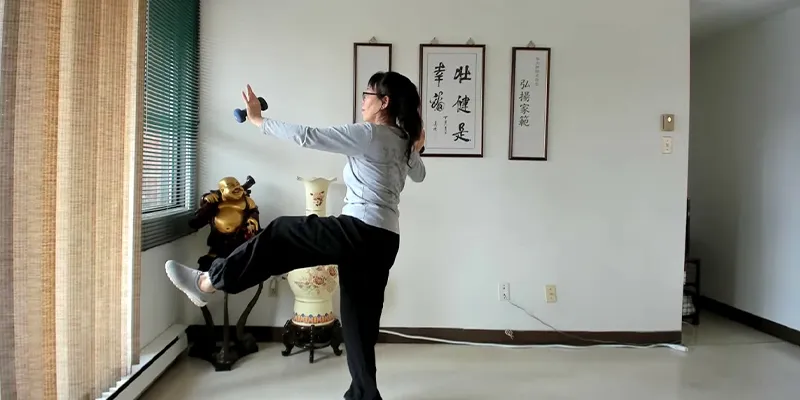
First, Tai Chi movements are likely very new and different from anything you’ve done before. Your brain is trying hard to learn the exact shapes your arms, legs, and body need to make all at the same time. This is like learning the steps to a complicated dance for the first time; it feels awkward because your brain and muscles haven’t built the memory for it yet.
Second, Tai Chi exercise requires moving very slowly and with smooth control. This is harder than moving quickly because you have to constantly balance your weight and keep many muscles working just right to avoid wobbling or jerking. Your body isn’t used to this kind of precise, slow movement, so it feels unsteady.
Third, you have to pay attention to many things at once: remembering what move comes next, keeping your posture straight, coordinating your arms and legs, breathing deeply, and staying balanced. Trying to focus on all these new things together is a lot for your brain to handle, making your movements seem less smooth.
Finally, the muscles needed for this slow, controlled balancing aren’t used to working in this exact way, so they might not respond as quickly or accurately as you want them to.
In conclusion, learning brand-new moves, moving slowly and precisely, focusing on many things, and using muscles in a new way will make it feel like your body isn’t cooperating. It’s not that you’re actually dumb; it’s that Tai Chi is a new skill your body and brain are still figuring out, and that takes practice.
Feel Lightheaded Dizzy Nauseous After Tai Chi Exercise
Feeling dizzy or nauseous after your first Tai Chi practice is common and usually happens for a few specific reasons related to how your body adjusts to the new movements.
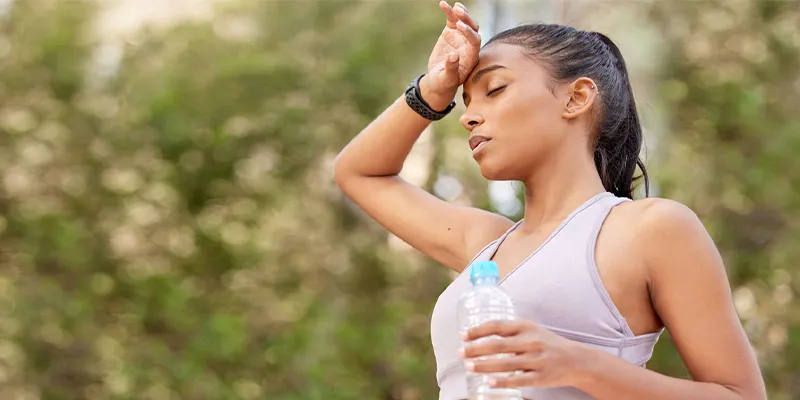
First, breathing is a big factor: beginners often hold their breath or breathe too shallowly without realizing it, especially when concentrating hard. When your body doesn’t get enough oxygen, it can make you feel lightheaded or queasy.
Second, the slow, smooth motions of Tai Chi exercises involve shifting your weight and turning your head or body steadily; this can affect the fluid in your inner ear, which controls your balance. If your inner ear isn’t used to these gentle but continuous movements, it might send confused signals to your brain, causing a dizzy or swaying feeling.
Third, lowering your stance for periods of time changes how blood flows in your body. If you stand up too quickly afterward, blood might not reach your brain fast enough, causing a brief dizzy spell.
Fourth, neck tension is common in beginners; if you stiffen your neck muscles while trying to focus or look down at your feet too much, it can strain nerves linked to balance and make you feel dizzy.
Fifth, eye focus matters: constantly looking down at your movements or quickly shifting your gaze during turns can overwhelm your visual system, adding to dizziness.
Finally, dehydration or low blood sugar (from not drinking enough water or eating properly before class) can make these sensations worse.
The good news is these feelings are temporary. As you practice more, your breathing becomes natural, your balance system adapts, and your movements flow smoothly, making dizziness and nausea much less likely. Drinking water, avoiding heavy meals right before practice, and telling your instructor about these feelings can also help.
What Is The Correct Tai Chi Exercise Feeling?
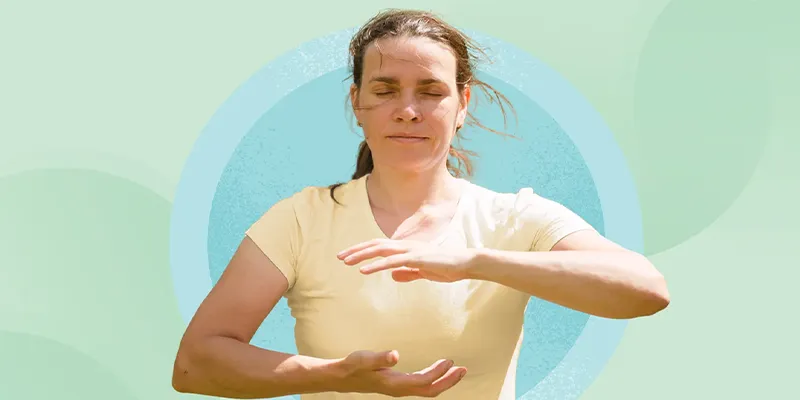
During Tai Chi Exercise:
When doing Tai Chi correctly, your body should feel relaxed but not weak. Your muscles should be soft and loose, not tight or stiff, like you’re wearing comfortable, loose clothing. You’ll feel your weight shifting smoothly from one leg to the other, like water flowing. Your movements should be slow, steady, and controlled, just like moving through water or pushing a cloud gently. Your breathing should be deep, natural and match your movements, like a smooth rhythm. You might feel a gentle warmth in your hands, arms, or belly, or a light tingling sensation—this is energy moving freely. Your mind should feel calm, focused on your body and breath, and not distracted by outside thoughts. You won’t feel rushed or strained. Instead, you’ll feel grounded and balanced, like a tree with strong roots.
After Tai Chi Exercise:
When you finish a Tai Chi exercise correctly, you should feel calm and refreshed, not exhausted or dizzy. Your body will feel pleasantly warm and loose, like after a gentle stretch. Any tension in your neck, shoulders, or back should be lessened. You might feel a subtle, steady energy throughout your body, not jittery like caffeine, but a quiet strength. Your mind should feel clear and peaceful, like after a good night’s sleep. Thoughts might be quieter, and you’ll feel more present and aware of your surroundings. You won’t feel clumsy or off-balance; instead, you’ll feel centered and stable. While very relaxed, you should also feel gently alert—like you’re awake but deeply at ease. Your body and mind feel connected and harmonious. This feeling of calm energy can last for hours.
How to Feel the Four Main Energies of Tai Chi?
Here’s how to start feeling Tai Chi’s four main energies, often called “Jin” or skills:
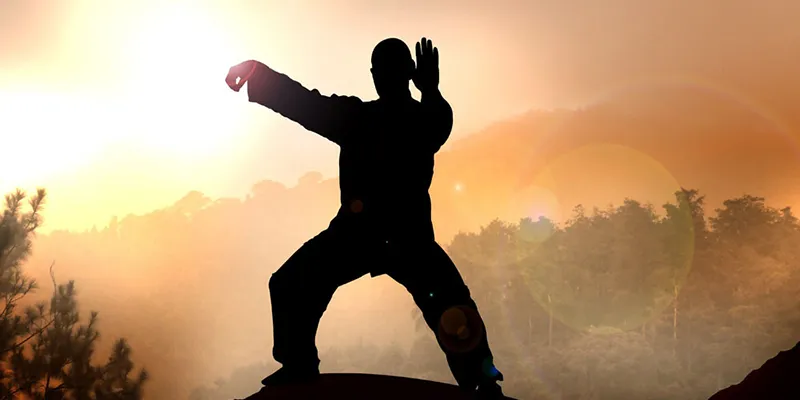
Push Down Energy (An Jin):
Imagine pressing something down and slightly away, like smoothly pushing a floating beach ball underwater. To feel it: Start with hands near your shoulders, palms down. Slowly press your palms downward and slightly forward, keeping elbows relaxed. Feel your body sink slightly into your legs as you press, like your weight is helping you push. The force goes down first, then forward, controlled by your legs and core. It feels grounded and heavy, not stiff.
Ward Off Energy (Peng Jin):
Imagine your whole body is gently pushing out in all directions, like a strong balloon being inflated. To feel it: Stand with knees slightly bent. Lift both arms in front of you, curved like you’re hugging a big beach ball. Gently push your palms toward the ball without straightening your arms. Feel a soft, round strength from your back and legs filling your arms. It’s like keeping your shape while someone lightly pushes you, and you stay springy and rooted.
Roll Back Energy (Lu Jin):
Think of guiding someone’s force away from you smoothly, like pulling a rope gently. To feel it: Have a partner push softly on your wrist. Instead of pushing back, turn your waist slightly and guide their arm down and to your side. Feel how you use your whole body to redirect their push, making it flow past you. It should feel controlled and calm, like steering a rolling ball.
Press Energy (Ji Jin):
Picture pressing forward steadily with both arms, like slowly squeezing a heavy spring between your palms. To feel it:Place one palm against your forearm (like forming a T-shape with your arms). Gently press forward with both arms together, using your legs and waist to drive the movement. Feel the power come up from your feet, through your legs and back, and out through both arms as one united force. It’s not a shove—it’s a steady, focused squeeze.
Conclusion
Feeling tired, sore, a little clumsy, or even dizzy after your very first Tai Chi exercise is completely normal and expected. It doesn’t mean you’re doing it wrong or that Tai Chi isn’t for you. These initial feelings are simply your body and mind reacting to something new and different. Tai Chi exercise asks you to move slowly, focus deeply, and use muscles and your balance in ways you might not be used to. It’s like learning a new language for your body.
The great news is that these first feelings change quickly with regular practice. As your body learns the movements and your mind learns to relax and focus, those uncomfortable sensations fade away. Instead, you’ll start noticing the true benefits: your muscles feeling pleasantly warm and relaxed instead of sore, your movements becoming smoother and more balanced instead of clumsy, and your mind feeling calm and clear instead of tired or foggy. You’ll be feel both peaceful and gently alert.
Don’t let those first exercise feelings stop you. Be patient and kind to yourself. Keep practicing consistently, even for short periods. Focus on slow movements, deep breathing, and staying relaxed. Pay attention to the positive changes as they happen. Soon, you’ll look forward to that wonderful feeling of harmony and quiet strength that comes after a Tai Chi exercise. Stick with it, and you’ll discover why millions love this gentle, powerful practice for both body and mind.



